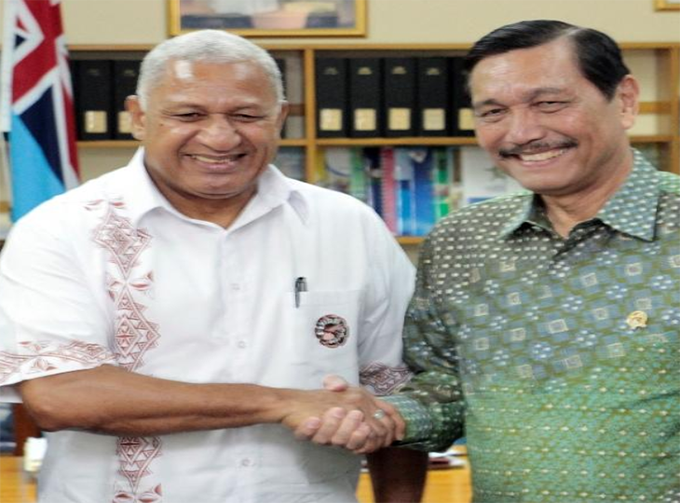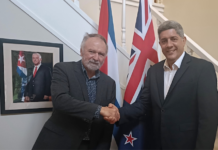
By Fardah Pewarta in Jakarta
Coordinating Minister for Political, Legal and Security Affairs Luhut Binsar Pandjaitan and his delegation’s recent trip to Fiji and Papua New Guinea demonstrates Indonesia’s commitment to forging strong bilateral relations with South Pacific countries.
The Indonesian delegation arrived in Suva, Fiji, on March 30 for a visit aimed at boosting bilateral relations between Indonesia and Fiji.
Minister Pandjaitan paid a courtesy call on Prime Minister Voreqe Bainimarama, held a bilateral meeting with Fiji’s Minister for Agricultural, Rural, Maritime Affairs and National Disaster Management Ina Seriaritu, and a luncheon with Foreign Minister Ratu Inoke Kubuabola.
The minister extended financial assistance worth US$5 million to help the victims of Tropical Cyclone Winston that hit Fiji in late February and delivered a letter from President Joko Widodo to Prime Minister Bainimarama.
In addition to the financial aid, Indonesia also sent US$3 million worth of goods for the victims of the cyclone.
The minister remarked that Indonesia would deploy engineer troops to help reconstruct Queen Victoria School on Lawaki Island.
“In early May, the TNI’s (Indonesian Defence Forces) engineer troops will arrive. We will also send 100 units of hand tractors to help develop agriculture here,” Pandjaitan said.
“I have conveyed to Prime Minister Bainimarama and Foreign Minister Kubuabola that we will be consistently present in the region,” the minister said.
Aid plan hailed
Minister Seriaritu hailed the aid and cooperation offered by Indonesia.
He said Indonesia was a key player in the Asia-Pacific region, and the country’s success in disaster management and mitigation had received international recognition.
However, he hoped that the two countries would intensify cooperation in other crucial fields such as education, agriculture, economy, and food security.
As part of the delegation’s agenda, Indonesian Chairman of the General Election Commission Husni Kamil Manik signed a memorandum of understanding on cooperation for the management of general elections with his Fijian counterpart.
During the meeting with Foreign Minister Kubuabola, Pandjaitan expressed Indonesia’s keenness to become a full member of the Melanesian Spearhead Group (MSG).
Kubuabola remarked that the government of Fiji had proposed upgrading the membership status of Indonesia in the MSG from an associate member to a full member to strengthen the nation’s position in the group of Melanesian countries.
Special staff of the Indonesian Foreign Ministry on strategic issues Djauhari Oratmangun, who was a member of the delegation, noted that Fiji was Indonesia’s “good friend” in the South Pacific region.
Backing MSG membership
In the context of the MSG, Fiji is among the countries to have supported Indonesia’s bid for full membership of the group, Oratmangun stated.
Similar support was also expressed by the PNG government when Minister Pandjaitan and his delegation had visited Port Moresby on April 1 after concluding their trip to Fiji.
Indonesia’s application to become a full MSG member was being processed, and thereafter, the way to obtain the full membership status would be opened, PNG Foreign and Immigration Minister Rimbink Pato said, following a bilateral meeting with the Indonesian delegation.
Papua New Guinea will host the MSG 21st Summit in 2017.
During its 20th Summit held in Honiara in the Solomon Islands on June 26, 2015, Indonesia had obtained associate member status.
At the bilateral meeting, Pato stated that the constructive and open talks covered various cooperation opportunities including in the fields of economy, investment, trade, and energy, particularly LNG, and flights connecting the two neighboring countries.
“The model of cooperation we have discussed covers many fields ranging from culture and trade to military cooperation. We also discussed a plan to cooperate in liquefied natural gas (LNG), palm oil, and intelligence,” minister Pato said.
Narrowing differences
“Basically, this cooperation is aimed at narrowing any differences between the two countries,” he said.
They also discussed cooperation between the two nations’ police and military, especially to guard the border areas.
PNG, which will host an APEC Summit in 2018, is eager to take a cue from Indonesia on ways to organise a major international meeting.
The two countries had signed 11 memoranda of understanding and three agreements to strengthen bilateral partnership based on mutual respect, he said.
“We will also learn from Indonesia’s rich experiences in democracy, and we [PNG and Indonesia] will move together and work in tandem,” said Pato, who was accompanied by PNG Trade Minister Richard Mare and National Development Planning Minister Charles Abe.
Minister Pandjaitan remarked that the two delegations also discussed cooperation in immigration affairs, trade, and the development of the palm oil industry.
“The Indonesian trade ministry’s delegation and business mission will visit PNG in late April this year. Our relations are becoming closer,” Pandjaitan affirmed.
PNG ties strengthened
At the invitation of PNG Prime Minister Peter O’Neill, President Joko Widodo visited Port Moresby last May 11-12 to strengthen bilateral cooperation in economic, trade, investment, and infrastructure construction fields.
The two leaders also agreed to increase the value of bilateral trade beyond trading activities in the border areas that reaches US$4.5 million a year.
To boost Indonesian diplomacy in the South Pacific region, Minister Pandjaitan proposed an appointment of an Indonesian special envoy to the South Pacific region.
The special envoy is also expected to help enhance communication between Indonesia and the governments and people of the countries in the region.
Indonesia will be consistently present in the South Pacific by sending ministers to 16 countries in the region, according to Pandjaitan.
“Diplomacy is important and we should be aggressively explaining to states in the South Pacific about the conditions and situation in Indonesia, including what we have been doing in the area of human rights,” he said.
Citing as an example, he said a number of parties in the South Pacific region thought that Indonesian people of the Melanesian race only inhabited the provinces of Papua and West Papua.
’11 million Melanesians’
Indonesia has at least 11 million people of Melanesian race, spreading among other things in the provinces of Papua, West Papua, Maluku, North Maluku and East Nusa Tenggara (NTT), Pandjaitan said. [Asia Pacific Report editor: This claim about the number of Melanesians in Indonesian provinces is highly contested and unverified].
In fact, the majority of Melanesians are living in Indonesia, approximately 80 percent of them, Kacung Marijan, Director-General of Culture at the Ministry of Education and Culture, said while Indonesia organised a Melanesian Cultural Festival in Kupang, East Nusa Tenggara, on last October 27-30.
To promote cultural pluralism existing in countries having a Melanesian population, the festival’s theme was “Celebrating the cultural diversity of Melanesian World”.
The Indonesian government hoped that the festival to help improve the public understanding of the Melanesian race, and strengthen cooperation among Melanesian countries.














































A dubious claim to begin with, Indonesia says it has 11 million Melanesians , and eighty percent of all Melanesians.
Considering PNG has 7 to 8 million and there’s almost 2 million in the others, Fiji, Vanuatu, Solomons, Kanaky etc, the Indonesian portion is not close to 80 percent.
Someone doesn’t understand maths… or accurate population facts. Or both.
[…] Source: Indonesia strengthens ties with Pacific ‘good friends’ […]
Comments are closed.